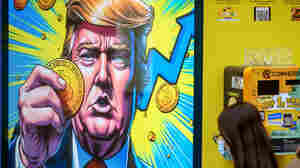

The Indicator from Planet Money
From NPR
A bite-sized show about big ideas. From the people who make Planet Money, The Indicator helps you make sense of what's happening in today's economy. It's a quick hit of insight into money, work, and business. Monday through Friday, in 10 minutes or less.
Most Recent Episodes
Workers on scaffolding lay blocks on one of the larger buildings at a development site where various residential units and commercial sites are under construction. Keith Srakocic/AP hide caption
Alabama head coach Kalen DeBoer makes nearly 11 million dollars per year over an eight year contract. Vasha Hunt/AP Newsroom hide caption
Episode art for Understood: Who broke the internet? Kelsey Cueva/CBC hide caption









